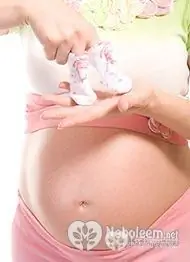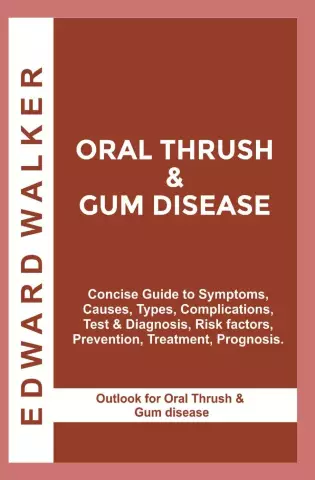- Author Rachel Wainwright wainwright@abchealthonline.com.
- Public 2023-12-15 07:39.
- Last modified 2025-11-02 20:14.
Mom's thrush
The magical waiting time for the baby and the joyful first months of a baby's life can be overshadowed by such unpleasant diseases as thrush.

Thrush (candidiasis) is a type of fungal infection caused by yeast-like fungi of the genus Candida. The causative agents of thrush are conditionally pathogenic microorganisms. This fungus is present in a small amount in the human body, but as soon as the immune system fails due to certain factors, their active reproduction begins.
At the same time, a woman experiences a number of unpleasant symptoms in the form of burning, itching in the perineal area, curdled discharge with a sour smell, discomfort during intercourse and urination. When symptoms of thrush appear, the mother must visit a doctor and undergo appropriate treatment.
The main reasons for the appearance of thrush in mom
All women at least once in their lives are faced with the problem of thrush. Most of them visit this disease in an "interesting" position. Thrush is especially common in the first trimester of pregnancy. If this problem has constantly bothered a woman before, then during pregnancy, the mother's thrush can often worsen.
The main factor in the development of thrush in the first trimester of pregnancy is that during this period a woman experiences an active change in the hormonal background of the body, which often also becomes the cause of thrush after childbirth, during lactation.
Mom's thrush can occur as a result of a weakened immune system, due to constant stress, disease, vitamin deficiency, and chronic diseases of internal organs.
The development of thrush is also facilitated by prolonged use of antibiotics and hormonal drugs, unhealthy diet, especially the excessive use of sweets, as well as wearing tight underwear made of unnatural materials.
Thrush is not a sexually transmitted disease, but is only the body's response to certain changes. Therefore, with persistent thrush before childbirth or after childbirth, constant relapses, a woman needs to look in the body for that pathology that creates favorable conditions in the body for the development of the disease.
What is the danger of thrush before childbirth and during lactation?
Thrush in the first trimester and later is a fairly common condition. Thrush before childbirth can and should be treated, because in addition to unpleasant symptoms, it is fraught with rather serious consequences.
The main danger of thrush during pregnancy is not for the women themselves, but for their children. So, there is a high probability that the child himself will become infected with thrush when passing through the birth canal and, subsequently, will suffer from painful and unpleasant candidal stomatitis, or from damage to the gastrointestinal tract. Thrush is especially dangerous after childbirth for premature babies, whose immunity is very weakened.
If thrush after childbirth began in a nursing mother, then the infection can spread to the breast. Thus, the infection can be transmitted to the baby during feeding, affecting the mucous membranes of his oral cavity and intestines. To prevent this, a woman needs to treat thrush before childbirth, and not run it.
Komarovsky about thrush
What does Komarovsky say about thrush? During pregnancy, thrush in mothers occurs in about 80-90 cases. In most cases, thrush is not dangerous for mothers, except for those cases when a woman experiences pronounced itching and discomfort. Komarovsky advises mothers to use antifungal suppositories for thrush, which can be purchased at any pharmacy without a prescription and are quite safe. But Komarovsky advises to use the tablet forms of medicines for thrush only in cases of systemic candidiasis.
Actually, all antifungal drugs that are freely sold in pharmacies (without a prescription) are safe for treating thrush before childbirth, but it is still better not to use them for thrush in the first trimester of pregnancy, like any other drugs.
After childbirth, thrush is also treated without any problems with the use of the same antifungal drugs that are not teratogenic and do not affect the health of the mother and baby.
Treatment of thrush in mothers
The period of pregnancy and lactation creates certain difficulties in the treatment of thrush, since the number of permissible drugs is sharply reduced - the health of the child is at stake in the first place. So, with thrush, a non-pregnant woman is usually prescribed tablet forms of drugs for oral administration. When these drugs enter the digestive system, they are absorbed into the bloodstream, where they act on the fungus. However, the tablets have increased toxicity and undesirable side effects, therefore, thrush in mothers is mainly treated with local drugs, namely, antifungal suppositories, ointments and vaginal tablets. But with thrush in the first trimester of pregnancy, drugs should be prescribed exclusively by the attending physician,which balances the potential risks to the fetus and the expected benefits to the mother.
Since candidiasis is often a companion of other diseases, its treatment should be approached comprehensively. So, a gynecologist often sends a pregnant or lactating woman for examination in order to identify factors that provoke the development of infection. This can be a general urine and blood test, a blood glucose test, an HIV test, a smear for sexually transmitted diseases. Often, a woman may also need to consult an endocrinologist and a gastroenterologist.

When treating thrush in mothers, a woman is often additionally prescribed vitamin therapy and fortifying drugs, probiotics with bifidobacteria.
It is important to treat candidiasis not only for the woman, but also for her sexual partner, and during treatment it is advisable to use barrier methods of contraception (condoms).
Prevention of thrush in mothers
In order to prevent the occurrence of the disease and relapse in the future, a woman should follow the following recommendations:
- Listening to the advice of a gynecologist, passing all the necessary tests on time - this will help to timely identify the infection in the early stages and respond in time;
- Lead an active lifestyle, avoid stressful situations, observe a rest regime;
- Eat properly and balanced, take multivitamin complexes;
- Do not wear tight underwear made of natural fabrics, do not get too carried away with douching, do not take various medications uncontrollably.
Also, do not get carried away with the treatment of thrush in mothers using folk methods, because not only the health of the woman, but also her baby depends on this.
Found a mistake in the text? Select it and press Ctrl + Enter.






